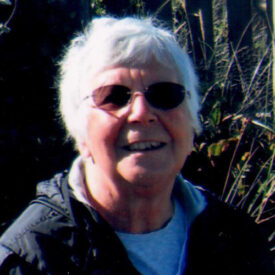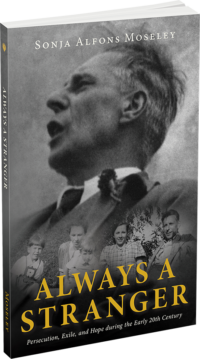
Sonja Moseley was born 1939 in Oslo, Norway. Her father, who had been active in the Austrian resistance against Nazism in the mid 30s, was forced to flee to avoid persecution. He and his partner found refuge in Norway. After the German army invaded Norway in 1940, they were again forced into exile, this time to Sweden. During their stay in Sweden a baby boy, Sonja’s brother, joined the family.
At the end of WWII the family returned to Austria. Protected by loving parents, Sonja and her brother were shielded from witnessing the most egregious suffering of the post-war years: the pain and trauma of those who had survived and poverty due to economic instability. In 1956, the family resettled in Uppsala, Sweden. Ten years later, Sonja moved to the United States.
Sonja reads, speaks, and writes fluently in three languages: German, Swedish, and English. She has an eclectic range of interests, including listening to chamber music, reading, walking, and writing. She also dabbles in genetics.
As a writer she has received small accolades. The Oregon Writers Colony awarded her First Honorary Mention for a non-fiction story. In 2017, she was invited to an international conference in Vienna, Austria, focusing on the experience of exile and its aftermath. Sonja’s presentation at the conference resulted in a published article included in the anthology, Lifetraces (“Lebensspuren,” Zwischenwelt 15), published by the DRAVA Verlag.
Today she is retired and lives with her husband in Eugene, Oregon. She can be seen trekking through the gentle hills in her neighborhood. She still writes occasionally.
Title by Sonja Alfons Moseley
-

Always a Stranger Persecution, Exile, and Hope during the Early 20th Century
by Sonja Alfons Moseley
- Released: June 2023
- Genre: Biography
During the politically turbulent years of the early twentieth century in central Europe, a child grows up in poverty, serves as a young soldier in WWI, participates in the labor movement, and joins the resistance against fascism and anti-Semitism. As a result, he suffers persecution and is forced into exile. Despite sacrificing his personal freedom, he succeeds in being a loving husband and caring father, and often makes time to share meals with friends and family. Social gatherings allow him to engage in passionate discussions about justice for all, always persevering in his hope and belief in a more equitable and conflict-free society.
Anton Alfons’s life, his spirit and actions resonate as much today as they did yesterday.